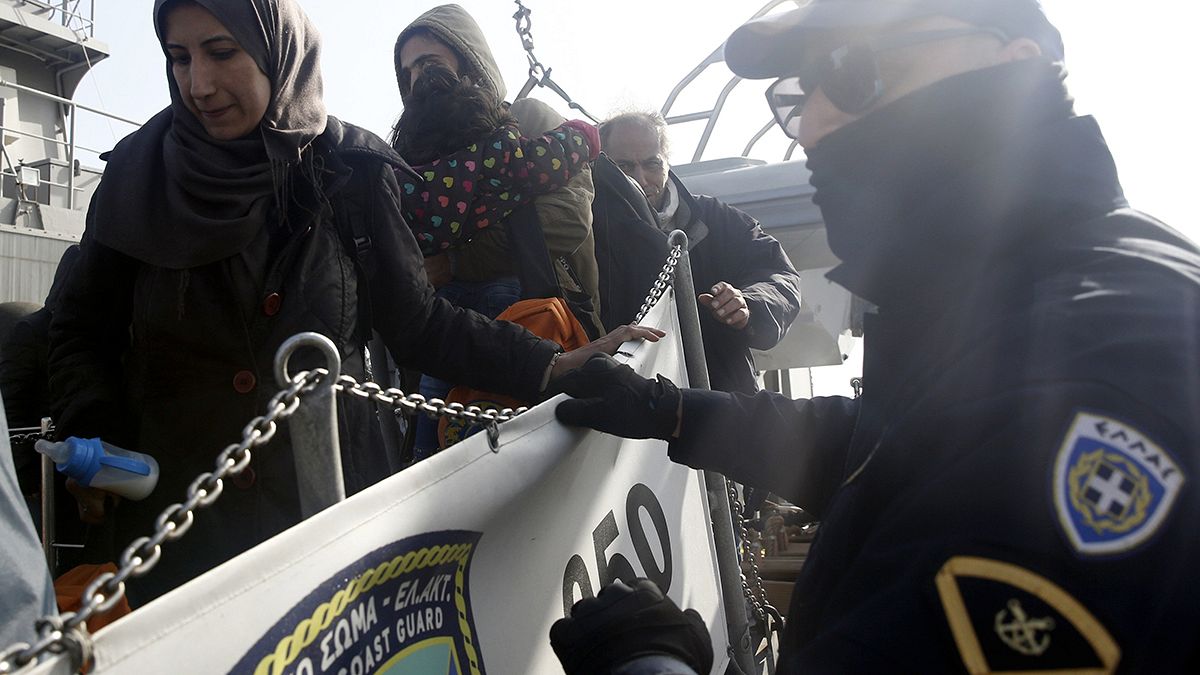The scene played out at dawn on the island of Lesbos was orderly in contrast to those witnessed on Greek shores in recent months. Two
The scene played out at dawn on the island of Lesbos was orderly in contrast to those witnessed on Greek shores in recent months.
Two Turkish-flagged passenger boats carrying more than 130 migrants were the first to set sail for Dikili in Turkey from the Greek port of Mytilene under a controversial European Union scheme.
A third boat carrying mainly Afghans later left the port of Chios.
The aim according to the European Commission is to stop the mass exodus orchestrated by human traffickers which saw a million people pour across the Aegean Sea to Greece, often in dangerous conditions, over the past year.
The returnees had earlier been taken from holding centres on the island. The EU’s border force Frontex helped Greek police with the operation.
“Today’s operation went very smoothly. It was very calm. Migrants went on to buses with their escorting officers. They came here, they collected their luggage and with their escorting officers, they boarded the ferries. There were no incidents,” said Frontex spokeswoman Ewa Moncure.
First refugees to be deported from #Lesbos getting inside of the boat that is taking them to Turkey pic.twitter.com/wNmA1wVpy0
— Lorena de la Cuesta (@LorenadlaCuesta) 4 April 2016
Only faces you can see well in pic of first returns under #EUTurkeyDeal: scared-looking deportee, stony-faced guard pic.twitter.com/7w0PKuiCdq
— Judith Sunderland (@sunderland_jude) 4 April 2016
A few dozen protesters by the quayside voiced their disapproval, bearing banners with slogans such as “Ferries for safe passage not deportation”, “Stop the deal” and “No human being is illegal”.
“Turkey is not a safe country for refugees,” read another placard, reflecting a major concern among protesters.
Refugee agencies and human rights campaigners have denounced the accord. A few days ago the UN human rights agency the UNHCR called for safeguards to be put into place before migrants began to be returned.
In return for advantages – including more money, early visa-free travel and progress in its EU membership negotiations – Turkey will take back all migrants arriving illegally in Greece if they don’t apply for asylum or their claim is rejected.
“It’s not an agreement at all, it’s not a solution! Well.. it’s all about money. I’m here with my heart, I care for people and we should take care of all vulnerable people in this world. This is why I’m here,” one woman protesting in Lesbos told euronews.
Activists protest against forced returns of refugees, migrants in Mytilene, #Lesbos. 136 were deported this morning pic.twitter.com/r6ySpf6Hgd
— Wenzel Michalski (@WenzelMichalski) 4 April 2016
“As long as there are question marks about safety #refugees, the returns should stop” https://t.co/fqu6kXHtFLpic.twitter.com/pkQUmOBdSh
— ALDE Group (@ALDEgroup) 4 April 2016
Under the deal, for every Syrian sent back, another Syrian will be resettled to Europe, directly from Turkey. However a recent Amnesty International report has accused Ankara of illegally returning thousands of Syrians to their war-torn country in recent months.
The Greek Ministry of Civil Protection released the following information about those returned to Turkey on Monday:
136 people were returned from Lesbos: 135 men and one woman, of whom 124 were Pakistanis, 3 were from Bangladesh, 1 from Iraq, 2 from India, 4 from Sri Lanka and 2 from Syria, who themselves asked to return.
66 people were taken back from Chios: 56 men and 10 women, of whom 42 were Afghans, 10 Iraqis, 6 Pakistanis, 1 from India, 1 from Somalia, 1 from Ivory Coast and 5 from Congo.
“i hate 2 say this but they were the easy ones,” frontex spokeswoman tells me after completion of expulsion op from #lesbos 2 #turkey
— Helena Smith (@HelenaSmithGDN) 4 April 2016
Euronews correspondent Apostolos Staikos reported from Lesbos:
“Firstly, migrant deportations are of great importance to Greece. Athens wants to show the international community that it’s implementing the agreement with Turkey. But with 52,000 refugees trapped and borders closed, the government is also trying to reassure Greeks, who are afraid that the situation will soon be uncontrollable.”
A few hours after the first boat set sail, Greek coastguard patrol vessels rescued at least two dinghies carrying more than 50 migrants and refugees, including children and a woman in a wheelchair, trying to reach the island.
Asked if he was aware the Greeks were sending people back, one man – a Syrian Kurd – said: “I heard maybe Iranians, Afghans. I didn’t heard they were sending back Syrians to Turkey… At least I did what I could. I’m alive – that’s it.”
See our updated migratory routes map. https://t.co/UCde8h1fyc
— Frontex (@Frontex) 4 April 2016
